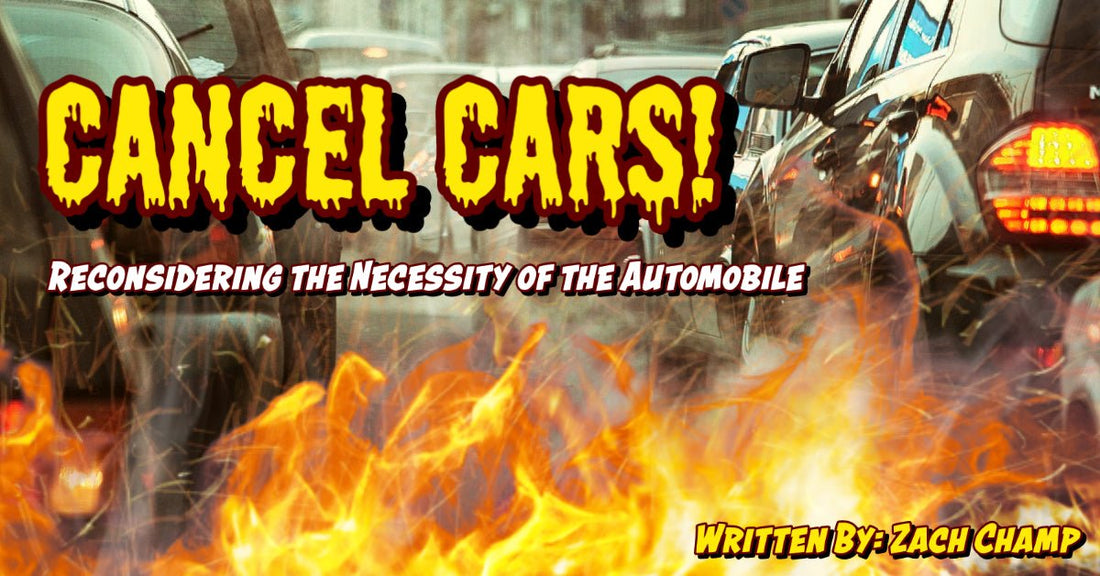WRITTEN BY: ZACH CHAMP
CONNECT WITH ME ON INSTAGRAM!

THE MYTH THAT CARS GIVE YOU FREEDOM
The American Dream sells us on the idea of independence and freedom. Nothing seemingly better encapsulates this idea of liberty more than owning your own vehicle!
Hitting the highway and embarking on road trips has always been a uniquely American pastime and tradition.

However, does owning a car actually liberate and empower the individual though?
I would like to play devil’s advocate and consider some of the disadvantages to owning a car and point out that owning a car is not all cracked out for what it’s meant to be!
When considering the average cost of financing a car including vehicle maintenance and upkeep, as well as insurance…

After everything is said and done, do you really have any money left over? The shocking answer is no.
Owning a car these days is not as simple as saving up a few thousand dollars and going to the dealership to choose your favorite vehicle.
Car prices have constantly been getting higher and higher, even for used vehicles!

Nearly all people will have to finance their purchase with a loan and down payment.
The average interest on automobile loans ranges from 5% for new cars to 10% for used cars!
Most dealerships require individuals to pass credit and background checks just to qualify to purchase the car.
The idea that financing a car can boost your personal credit is a trap, a lie, and a scam.
Making payments on time for your car will only increase your credit score after the car is paid off in its entirety, and only by a small amount of usually 50-75 points.
On the flip side, missing payments on your car, even after 1-2 months will result in your car being repossessed and a deduction to your credit score of typically 100 points.

If you miss even one payment you typically will only receive a partial raise in credit score upon finishing payments on your car.
So owning a car is a risky venture towards an individual’s personal credit, and even then it rarely boosts your credit even when successfully paid on time…
When owning a vehicle you also are required to maintain insurance coverage by law.
There are several types of automobile insurance available, but even basic plans which provide limited coverage will cost you up to $100 a month!

Many of these basic coverage plans won’t even reimburse you fully if you experience a car accident and total your car…
The counter-intuitive truth is that personal vehicles are an expensive ball and chain for practically all people and the average person will save more money by NOT OWNING a car!
Do you legitimately need a car to move around? The majority of people who live within the suburbs of America live within a 30 minute drive from their job or place of employment. If you live in the city then you more than likely live within less than 10 miles from your place of employment. In either case there are several alternate forms of transportation available for you to choose to get to and from work and home.

Most cities in America have a metropolitan transportation system such as a bus route system.
City buses can help individuals who do not own a car to get to and from work and reach shopping areas that normally are outside of walking distance.
One of the most under-rated forms of public transportation is the passenger rail systems such as AMTRAK or the VRE that we have locally here in Virginia.
Commuter trains are cheap and an affordable option for those looking to commute from the suburbs to the city each day.

There are plenty of benefits to using commuter trains over driving a car. Commuter trains are often faster than driving in traffic on major highways, and they cut through scenic beautiful areas including forests, rivers, and by lakes and large bodies of water. Trains have Wi-Fi and allow you a chance to collect yourself, work on projects, send emails, and so on during your morning and evening commutes.

CARS DESTROY THE ENVIRONMENT
It is no secret that cars are detrimental to the environment. It’s common sense!
The main problem with cars is the pollution caused by emissions from vehicle exhaust and the negative effects of carbon dioxide.

Have you ever heard of a person who committed suicide or who accidentally died from running a car in a confined space?
The reason these people die and the reason why you should never run a vehicle within a confined space like a garage is because the exhaust from vehicles is a deadly greenhouse gas called carbon dioxide.
Carbon dioxide is a natural byproduct of life on Earth and naturally occurring geologic phenomena. Carbon dioxide has never been a serious issue throughout human history until the massive changes caused by industrialization and globalization of our modern world occurred.

Modern society is structured around fossil fuels and an oil-based economy, a.k.a the ‘petro-dollar’.
As a result, the grand total of CO2 emissions from cars and highways, international maritime shipping, global airplane traffic, and such all release large amounts of carbon dioxide into the atmosphere, an amount exponentially greater than ever before seen in the natural history of Earth.

If carbon dioxide is obviously poisonous enough to kill us in confined spaces, then the combined release of toxic emissions from each individual automobile driving on the roads is definitely an issue of concern for the environment and atmosphere.
The sky doesn’t go on forever into infinity… quite the opposite, there’s only a few miles between the surface of the planet and the beginning of outer space.
When greenhouse gasses like carbon dioxide accumulate in the upper reaches of the atmosphere, they cause damage to the Earth’s volatile and critically important ozone layer. The ozone layer filters the sun’s harmful ultraviolet light.

Without it, we would experience dramatically increased surface temperatures on the planet and would be vulnerable to dangerous UV light which causes skin cancer and other serious medical issues.
Almost ⅓ of all greenhouse gas emissions in the United States come from gas and diesel-powered vehicles.
The only way to address this problem is for our lawmakers to create regulations that help incentivize and focus the automobile industry on developing cleaner fuels and more gas efficient vehicles.
We also need to reduce the number of vehicles on the road to reduce the impact of continued CO2 emissions into the atmosphere.

That means building and funding more public transportation options in America’s cities and suburbs!
You may think that electric vehicles (EVs) and hybrid vehicles are safe for the environment, but unfortunately that is not the case.
While the technology is promising and may be beneficial in the future, the batteries of modern EV and hybrid vehicles are made from rare minerals found deep within the Earth such as lithium, cobalt, nickel, and manganese.

Numerous rare earth metals are found in third world countries where local populations are often living in crippling poverty. Large mining conglomerates will set up operations in these areas at the expense of local populations. Mining these rare earth metals often destroys the landscape and pollutes rivers and watersheds.
It is common for local people to experience increased cases of cancer due to the proximity of their villages and towns next to the mining operations. There is little development or investment in these communities, and workers for the mines are usually paid little to keep them in the vicious cycle of resource extraction and poverty.

Car batteries are often trashed in landfills and not recycled, adding continued damage to the environment.
The manufacturing of vehicles and automobiles consumes large amounts of natural resources and energy. The average car requires 1200 gallons of gasoline to produce- the equivalent of two years worth of gas!
Roads and highways destroy the land and take up space. Most are not even designed in a way that facilitates the increased flow of traffic in suburban and urban areas.

We constantly keep creating concrete megaliths around our cities and suburbs, but no one is getting anywhere faster… These roads actually increase traffic!
Anyone who tries to convince you that climate change is not a serious issue is ignorant and either purposefully trying to deceive you, or they are literally clueless to the fine homeostatic forces of nature and the environment.
Either way, those individuals do not have anything to offer you in terms of you and your family’s best interest and continued survival in an ever-changing chaotic world…

CARS KILL PEOPLE
Roughly 50,000 people die each year in an automobile accident, corresponding to a rate of 13 people for every 100,000 inhabitants. In comparison, only 300 people die each year using public transportation, a stark contrast and difference.

It is estimated that nearly 1 million people die each year in automobile accidents around the World. That’s crazy!
Personal vehicles are the most dangerous form of transportation in the United States- more dangerous than buses, boats, and airplanes combined!
Sitting in traffic for prolonged periods of time is bad for your physical health and can cause issues such as lower back-pain, increased blood pressure, gastrointestinal problems, an increased risk for obesity, and even an increased chance of developing certain types of cancer!

Not only can sitting in traffic impact your body, it can also affect your mental health and can cause stress, anger, fatigue, and more!
For instance, one study found that individuals who live in areas with higher than normal traffic often report higher rates of depression and depression-like symptoms than those who live in areas without traffic!

Even hearing the noise of traffic can increase anxiety and stress in individuals who live near major roadways and intersections.
The average American spends around 300 hours commuting to work and sitting in traffic, equating to one year of their life. Daily traffic is estimated to cost the United States GDP around $100 Billion per year in lost time and wasted fuel.
Sitting in traffic is an almost seemingly unavoidable waste of time and money, and this can lead to anger and frustration across the board for many.

We all know what happens when we become mad while driving… All drivers at some point experience road rage- the feeling of anger when stuck or confronted with traffic.
While everyone agrees they grow upset sometimes while sitting in traffic, nearly ½ of all American drivers in the past year reported that when angry on the road they performed some form of aggressive driving such as beeping their horn, cussing out the window, tail-gating, or flipping off other drivers.

Over the past 7 years a total of 12,610 injuries and 218 murders have been reported as a consequence of road-rage in the United States.
The number one reason for aggressive driving on the roads and highways has been reported as running late to work or an important errand.
When people are rushing and confronted with the inevitability of traffic and being late, they get mad. This cognitive dissonance resonates outward and creates chaos in the community.
Yet everyone accepts this reality as a way of life! How insane is that?









